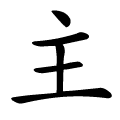主
- king;
- lord, master, sovereign;
Etymology
It is a pictograph modeled after the image of a flame burning on a lamp plate.
The top dot 丶 represents the flame,
The lower part 王 looks like a candlestick, though it has no relation to the character 王 ("king") in terms of meaning.
Originally, 主 was written as just 丶, and this character evolved into a more detailed form. In old Korean writing, 丶 was sometimes drawn upright.
The character’s original meaning was 炷 (wick), referring to the wick of a lamp.
Semantic вevelopment:
- lamp / flame (original concrete meaning);
- central authority;
- owner / master;
- main / principal;
- Lord / God.
Usage in Korean
주인 (主人) — owner; master
민주주의 (民主主義) — democracy
군주 (君主) — monarch
주최 (主催) — host
천주 (天主) — Lord (Catholic term for God)
The suffix -주 (主) is widely used to refer to owners or holders, as in:
건물주 – building owner
소유주 – property owner
차주 – car owner
It refers to a ruler, a master (as in 主人, meaning "owner"; the native Korean term is 임자).
For royalty:
A ruler may be represented with 王, 君 (gun), or 主.
君主 (gunju) means "monarch" or "sovereign."
In historical Korean dramas, the king is called 주상전하 ("Jusang Jeonha"), where 주 (主) refers to the ruler.
Female monarchs are called 女主 (yeoju), and this term was also applied to queen dowagers or regents (e.g., 대왕대비 or 왕대비) who held real political power.
As a verb, 主 is used in contexts such as:
주관하다 (to preside over)
책임지다 (to take responsibility)
주장하다 (to assert or claim)
예시하다 (to exemplify)
As an adjective, it is used in phrases like:
주되다 – meaning "primary" or "main"
Most ideologies end in 주의 (主義), the suffix meaning “-ism,” such as:
민주주의 (democracy)
공산주의 (communism)
자본주의 (capitalism)
In this context, 主 reflects the idea of central principle or main idea.
Words that derived from 主
- 간접주관권(間接主管圈)–the realm of indirect dominion
- 개인주의(個人主義)–individualism
- 공산주의(共産主義)–communism
- 공주(公主)–princess
- 구세주(救世主)–Savior
- 구주(救主)–savior; the Messiah
- 군주(君主)–king
- 금욕주의(禁慾主義)–stoicism; asceticism
- 민족주의(民族主義)–nationalism
- 민주(民主)–democracy
- 민주주의(民主主義)–democracy
- 사대주의(事大主義)–flunkyism
- 사회주의(社會主義)–socialism
- 신주(神主)–spirit tablet; memorial tablet; ancestral tablet
- 안주인(안主人)–hostess; host's wife
- 애국주의(愛國主義)–patriotism
- 원리결과주관권(原理結果主觀圈)–the realm of dominion based on accomplishments through the Principle
- 위주(爲主)–center; focus
- 이타주의(利他主義)–altruism
- 인도주의(人道主義)–humanitarianism; humanity
- 자본주의(資本主義)–capitalism
- 전제주의(專制主義)–absolutism; despotism
- 전주(錢主)–investor; creditor
- 전체주의(全體主義)–totalitarianism
- 제국주의(帝國主義)–imperialism
- 제일주의(第一主義)–prioritization
- 조물주(造物主)–the Creator; Creator
- 주(主)–being main
- 주관성(主觀性)–subjectivity
- 주관자(主管者)–host
- 주권(主權)–sovereignty
- 주님(主님)–Lord
- 주도(主導)–leading
- 주로(主로)–usually
- 주류(主流)–main stream; mainstream
- 주부(主婦)–homemaker
- 주식(主食)–staple
- 주어(主語)–subject
- 주요(主要)–being key
- 주의(主義)–belief; attitude; theory
- 주인(主人)–owner; leader; master; husband; host; hostess
- 주인공(主人公)–main character; leader; hero; winner; owner
- 주일(主日)–the Lord's day
- 주재(主宰)–presiding; presider; leader
- 주전(主戰)–being main
- 주제(主題)–subject; theme
- 주주(株主)–shareholder; stockholder
- 주체(主體)–owner; key member; main actor; agent; subject
- 줏대(主대)–independence of thought
- 지주(地主)–landowner
- 직접주관권(直接主管圈)–the realm of direct dominion
- 창조주(創造主)–the Creator; God
- 합리주의(合理主義)–rationalism
- 호주(戶主)–head of a household
- 卜土 (YG)
- ⿱ 丶 王
- ⿱ 亠 土
